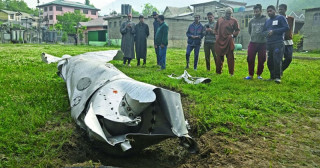بوتلوں کے پانی کے 8 برانڈز انسانوں کے لیے غیرمحفوظ

اسلام آباد: ایک سرکاری لیبارٹری میں مارکیٹ میں دستیاب بوتلوں کے پانی اور منرل واٹر کے آٹھ برانڈز کو انسانوں کے لیے ’’مکمل طور پر غیرمحفوظ‘‘ قرار دیا ہے، اس لیے کہ یہ ’’کیمیائی اور حیاتیاتی طور پر آلودہ‘‘ ہے۔
پانی کے وسائل پر تحقیق کرنے والی پاکستانی کونسل (پی سی آر ڈبلیو آر) نے جنوری تا مارچ 2015ء کے لیے اپنی سہہ ماہی رپورٹ میں کہا ہے کہ ’’پاکستان اسٹینڈرڈ اینڈ کوالٹی کنٹرول اتھارٹی (پی ایس کیو سی اے) کے مقرر کردہ معیار کے تحت ایک موازنے کے تجزیاتی نتائج میں انکشاف ہوا کہ کیمیائی اور حیاتیاتی آلودگی کی وجہ سے آٹھ برانڈ غیرمحفوظ ہیں۔‘‘
پی سی آر ڈبلیو آر جو وزارتِ سائنس اینڈ ٹیکنالوجی کا ایک حصہ ہے، کے مطابق بوتلوں کے پانی کے برانڈز جو استعمال کے لیے غیرمحفوظ پائے گئے، ان میں الحیدر، نوبل، ڈراپ آئس، الثنا، ڈیز پیور، ایفرٹ، اکوا سیف اور بٹ شامل ہیں۔
اسلام آباد، راولپنڈی، لاہور، سیالکوٹ، کراچی، ٹنڈوجام اور کوئٹہ سمیت ملک کے سات شہروں کی مقامی مارکیٹوں سے پی سی آر ڈبلیو آر نے تجارتی طور پر دستیاب بوتلوں کے پانی کے برانڈز کے 71 نمونے اکھٹا کیے تھے۔
اس رپورٹ کا کہنا ہے کہ الثناء، اکوا سیف اور ڈیز پیور کے تین غیر محفوظ برانڈز میں سنکھیا کی سطح نسبتاً زیادہ ہے۔
واضح رہے کہ پانی میں سنکھیا کی زیادہ مقدار جلد کے امراض، ذیابیطس، گردے کی بیماریاں، ہائی بلڈپریشر، دل کے امراض، پیدائشی نقائص، سیاہ پاؤں کی بیماری اور کینسر کی مختلف اقسام کا سبب بن سکتی ہے۔
دیگر تین برانڈز ڈراپ آئس، ایفرٹ اور بٹ کو حیاتیاتی آلودگیوں کی وجہ سے غیرمحفوظ پایا گیا، جو کالرہ، ڈائریا، پیچش، ہیپاٹائٹس اور ٹائیفائیڈ وغیرہ کا سبب بن سکتی ہے۔
رپورٹ کے مطابق اس کے علاوہ نوبل، ڈیز پیور، اکوا سیف میں سوڈیم کی زیادہ مقدار غیرمعمولی طور پر شامل تھی، الحیدر برانڈ میں پوٹاشیم کی سطح خطرناک حد تک زیادہ پائی گئی۔
پی سی آر ڈبلیو آر نے کوالٹی کنٹرول اور نگرانی کے قومی اداروں پر زور دیا ہے کہ وہ ان کمپنیوں کے خلاف قانونی چارہ جوئی کریں، جو بوتلوں میں آلودہ پانی عوام کو فراہم کرکے عوام کی صحت کے ساتھ کھیل رہے ہیں۔
بوتلوں کے پانی کی نگرانی اور میعار کو بہتر بنانے کے لیے وفاقی حکومت نے وزارتِ سائنس و ٹیکنالوجی کے ذریعے پی سی آر ڈبلیو آر کو بوتلوں کے پانی اور منرل واٹر کی نگرانی اور سہہ ماہی بنیاد پر اس کے نتائج عوام کی آگاہی کے لیے شایع کرنے کی ذمہ داری تفویض کی ہے۔
بوتلوں کے پانی کے معیار کی نگرانی کا کام وفاقی کابینہ کی ہدایات پر کیا جارہا ہے۔
اس جانچ کے لیے نیشنل واٹر کوالٹی لیبارٹری اور پی سی آر ڈبلیو آر کی علاقائی اور ضلعی لیبارٹریوں کے عملے کے سینئر اراکین نے اکھٹے کیے تھے۔
رپورٹ میں وضاحت کی گئی ہے کہ ’’ہر ایک برانڈز کی چار چار بوتلوں کا ایک سیٹ اکھٹا کرکے موقع پر ہی اس کو مہربند کردیا گیا تھا۔ بوتلوں کے پانی کے لیے پی سی آر ڈبلیو آر کے درجہ بندی کے نظام کے مطابق تمام برانڈز کے لیے شناختی کوڈز مختص کردیے گئے تھے۔‘‘
اس رپورٹ میں بتایا گیا ہے کہ صرف 34 برانڈز مارکیٹ میں مسلسل موجود تھے، اور 2014ء کی آخری سہ ماہی میں تجزیہ کیے گئے 42 برانڈز مارکیٹ سے غائب تھے، جبکہ 37 نئے برانڈز یا تبدیل شدہ برانڈز کی اقسام مارکیٹ میں دستیاب تھیں۔
انسانی فضلے، صنعتوں سے آنے والی کیمیائی آلودگی اور زراعت کی وجہ سے پینے کے پانی کا میعار مسلسل گررہا ہے۔
آلودگی کی وجوہات کا حوالہ دیتے ہوئے رپورٹ کا کہنا ہے کہ نلوں میں آنے والا پانی بھی آلودہ ہورہا ہے، اس لیے کہ پینے کے پانی کی لائنیں سیوریج لائنوں یا سیوریج کی کھلی نالیوں سے انتہائی قریب ہیں، جو پانی سے پیدا ہونے والی کئی بیماریوں کا سبب ہیں۔
یہ بھی علم میں آیا ہے کہ پاکستان میں 45 فیصد نومولود بچوں کی اموات کی وجہ ڈائریا ہے، اور مجموعی طور پر تقریباً 60 فیصد انفیکشن پانی کی وجہ سے لاحق ہوتے ہیں۔
عالمی ادارہ صحت کے مطابق تمام امراض میں پچیس سے تیس فیصد معدے اور آنتوں سے متعلق ہیں۔
پینے کے پانی کے ناقص معیار کی وجہ سے شہریوں کی ایک بڑی تعداد بوتلوں کا پانی خریدنے پر مجبور ہے۔
اس کے نتیجے میں یہ مارکیٹ وسیع ہوتی جارہی ہے، اور پچھلے چند سالوں کے دوران بوتلوں کا پانی تیار کرنے والوں کی ملک میں مشروم گروتھ دیکھی گئی ہے۔ تاہم بہت سی منرل واٹر کمپنیاں آلودہ پانی فروخت کرتی پائی گئی ہیں۔
8 bottled water brands found to be ‘unsafe for consumption’
ISLAMABAD: A government laboratory has declared that eight brands of mineral and bottled water – currently available on the open market – are “completely unsafe” for human consumption due to “chemical and microbiological contaminations”.
“[A] comparison of analytical findings with the permissible limits set by the Pakistan Standards and Quality Control Authority (PSQCA) has revealed that eight brands are unsafe due to chemical or microbiological contamination,” says the quarterly report of the Pakistan Council of Research in Water Resources (PCRWR) for January-March 2015.
According to PCRWR – which is a part of the Ministry of Science and Techonology – bottled water brands that were found to be unsafe for consumption include the brands Al-Haider, Noble, Drop Ice, Al-Sana, Days Pure, Effort, Aqua Safe and Butt.
The PCRWR had collected samples of 71 commercially available bottled water brands from local markets in seven cities of the country, including Islamabad, Rawalpindi, Lahore, Sialkot, Karachi, Tando Jam and Quetta.
The report says that three of the unsafe brands – Al-Sana, Aqua Safe and Days Pure – have comparatively high arsenic levels, ranging from 11-35 parts per billion (ppb) as opposed to the Pakistan Standards and Quality Control Authority’s definition, should be less than 10 ppb.
Unsafe brands had high levels of sodium, potassium, arsenic and biological contaminants
Excessive arsenic in the water can cause various disorders of the skin, diabetes, kidney problems, hypertension, heart ailments, birth defects, black foot and multiple cancers.
Three other brands – Drop Ice, Effort and Butt – were found to be unsafe due to “microbiological contamination which may cause cholera, diarrhoea, dysentery, hepatitis and typhoid etc.”
Noble, Days Pure, Aqua Safe also contain unusually high quantities of sodium, which the levels of potassium found in the Al-Haider brand are also alarmingly high, according to the report.
The PCRWR has urged national quality control and surveillance authorities to take legal action against the companies that are supplying contaminated bottled water to the public and in doing so are toying with public health.
To monitor and improve the quality of bottled water, the federal government has assigned the PCRWR, through the Ministry of Science and Technology, to monitor bottled and mineral water brands and on a quarterly basis and publicise to the results for the information of the general public. The exercise of monitoring the quality of bottled water is carried out on the directives of the federal cabinet.
The samples used in the study were collected by senior staff members of the National Water Quality Laboratory and regional and district water quality laboratories of the PCRWR. “A set of four bottles of each brand was collected and sealed on site. Identification codes were allotted to all the brands according to the PCRWR Bottled Water Classification System,” explains the report.
According to the report, only 34 brands were consistently present in the market and 42 brands that were previously analysed in the last quarters of 2014 disappeared while 37 new brands or rebranded varieties were available in the market.
Drinking water quality is continuously deteriorating due to biological contamination from human waste, chemical pollutants from industries and agricultural inputs.
Citing reasons for the contamination, the report says that piped water also becomes contaminated because the pipes are laid very close to sewage lines or open drains, which are the cause of several water-borne diseases. It was found that 45 per cent of infant deaths in Pakistan could be attributed to diarrhoea and about 60 per cent to overall infectious waterborne diseases.
According to the World Health Organization (WHO), 25 to 30 per cent of all diseases are gastro-intestinal in nature.
The poor quality of drinking water has forced a large cross-section of citizens to buy bottled water. As a consequence of this expanding market, a mushroom growth of bottled water manufacturers has been witnessed in the country over the past few years. However, many of the mineral water companies have been found to be selling contaminated water.
Published in Dawn, April 10th, 2015
http://www.dawnnews.tv/news/1019615
Last edited by a moderator:






































